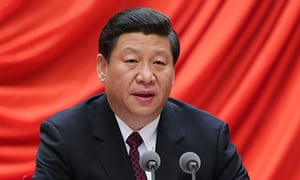 Dharamshala — “We will never allow anyone, any organization, or any political party, at any time or in any form, to separate any part of Chinese territory from China,” said President Xi Jinping during the opening remarks of the19th National Congress of the Communist Party of China, an indication of his unchanging and harsh policies for Tibet.
Dharamshala — “We will never allow anyone, any organization, or any political party, at any time or in any form, to separate any part of Chinese territory from China,” said President Xi Jinping during the opening remarks of the19th National Congress of the Communist Party of China, an indication of his unchanging and harsh policies for Tibet.
Among the many territories and countries under China that seek changes in the status-quo include Tibet, Xinjiang, Taiwan and Hong Kong. Xi was especially vocal when it came to Taiwan and Hong Kong, as there were uprisings and calls for independence during his first term, though his statement is assumed to include Tibet as well.
“We will never allow anyone, any organization, or any political party, at any time or in any form, to separate any part of Chinese territory from China,” Xi said in his three and a half hour speech at the Great Hall of the People in Beijing on October 19.
“We will resolutely safeguard the national sovereignty and territorial integrity and will absolutely not tolerate the tragedy of the country’s split. Any activity aiming to split the motherland will be firmly opposed by all the Chinese people. We have a firm will, sufficient faith, and adequate capacity to defeat any intention of “Taiwan independence” in any form,” Xi said on Taiwan.
Regarding Hong Kong, the head of the regime said, “We must maintain the central authority in Hong Kong and guarantee Hong Kong’s autonomy at the same time. We must ensure that the ‘one country, two systems’ policy will not change or deform.” He reiterated that any calls for independence is out of the question.
During the party congress, Xi Jinping was consecrated as China’s most powerful leader since Mao Zedong, as the party voted unanimously to add a new body of political thought carrying Xi's name to the Communist party’s constitution. Since the Communist party of China was founded in 1921, only one leader, Mao himself, has been honored this way while still alive.
In Tibet, Xi Jinping's crackdown on corruption in the government and party during his first 5-year-tenure has been used as a tool consolidate his authority and to eliminate his opponents, pushing an anti-Dalai Lama campaign and escalating it's crackdown rather than dealing with problems relating to corruption.
Chinese media have seen increasing constraints since Xi came to power. On November 2, 2016, the Paris based media watch-dog Reporters Without Borders (RSF) said that “China continues to be the world’s leading country for censorship, self-censorship and the suppression of freely-reported news and information.”
RSF also published a gallery of 35 press freedom predators around the world, with Xi Jinping among them. His “kill tally” numbers over 100 journalists and bloggers currently jailed.
Representatives of the five major Tibetan NGOs while speaking to members of media in Dharamshala, India, on October 17, 2017, called Chinese President Xi a "Dictator of the unfree world", with five years of failure in Tibet.
They said: "When Xi was appointed as the President of Communist Party of China, many around the world hoped tor positive change and the relaxation of the harsh policies in Tibet. However, Xi has failed to live up those expectations and hopes."
Torture, arbitrary arrest and imprisonment, and government surveillance are commonplace. Chinese solders or intelligence agents reside in monasteries and that there is an extensive network of spies. A climate of fear pervades most parts of Tibet and religious figures are the primary focus of Chinese severe repression. Human Rights organizations around the world that have investigated the situation agree that freedom of religion is nonexistent in Tibet.
Tibet was invaded by the Communist regime in China, starting in 1949. Since that time, over 1.2 million out of 6 Tibetans died as a direct result of China's invasion and continued occupation of Tibet, over 6000 monasteries have been looted and destroyed— and acts of murder, rape, arbitrary imprisonment, torture, and cruel, inhuman and degrading treatment have been inflicted on the Tibetans inside Tibet. Beijing continues to call this a "peaceful liberation".


![Tibet has a rich history as a sovereign nation until the 1950s when it was invaded by China. [Photo: File]](/images/stories/Pics-2024/March/Tibet-Nation-1940s.jpg#joomlaImage://local-images/stories/Pics-2024/March/Tibet-Nation-1940s.jpg?width=1489&height=878)















